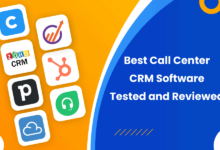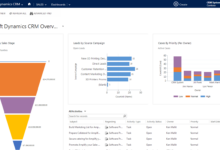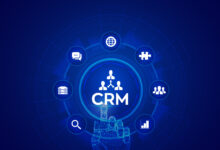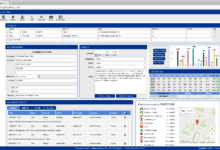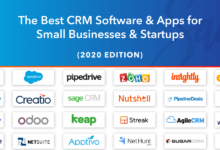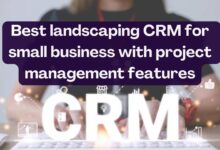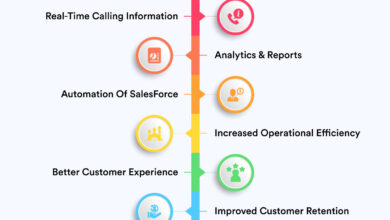Best Contractor CRM: Streamlining Your Business
Best Contractor CRM software is revolutionizing how contractors manage their businesses. No longer are spreadsheets and scattered notes the norm; sophisticated CRM systems offer integrated solutions for project management, client communication, and financial tracking, leading to increased efficiency and profitability. This exploration delves into the key features, integration capabilities, security considerations, and selection process involved in choosing the best CRM for your contracting needs, ultimately empowering you to make informed decisions that drive growth.
We’ll examine how different CRM features cater to varying contractor business sizes, from solo operators to large teams, highlighting the importance of scalability and adaptability. The analysis will encompass a comparison of leading CRM platforms, detailing their strengths and weaknesses to assist you in identifying the perfect fit for your unique operational structure and budget.
Defining “Best” in Contractor CRM Software
Choosing the “best” contractor CRM software isn’t about a single, perfect solution, but rather finding the optimal fit for your specific business needs. Several key factors contribute to this assessment, demanding careful consideration before making a decision. The ideal software seamlessly integrates into your workflow, enhancing productivity and profitability.
The criteria for determining the best contractor CRM software involves a multifaceted evaluation of ease of use, feature set, pricing structure, and scalability. Ease of use refers to the intuitive design and user-friendliness of the interface. A system that’s difficult to navigate will hinder adoption and negate potential benefits. Feature-richness is crucial, encompassing functionalities directly relevant to contractor operations. Pricing should align with your budget, offering value for the investment. Finally, scalability ensures the CRM can adapt to your business’s growth without requiring a complete system overhaul.
CRM Feature Comparison for Contractors
Contractors require CRM software tailored to their unique operational demands. A direct comparison of key features reveals significant differences in functionality and suitability for various business models. Project management tools, for example, are crucial for tracking progress, managing resources, and ensuring timely completion. Scheduling features facilitate efficient appointment booking and resource allocation. Robust invoicing capabilities streamline billing processes and enhance cash flow management. Let’s compare these key features across different CRM platforms:
| Feature | CRM A (Example: JobNimbus) | CRM B (Example: CoConstruct) | CRM C (Example: Housecall Pro) |
|---|---|---|---|
| Project Management | Comprehensive task management, progress tracking, and team collaboration tools. | Strong focus on project timelines, budgets, and document management. | Basic project tracking, more focused on scheduling and client communication. |
| Scheduling | Integrated calendar, appointment scheduling, and automated reminders. | Robust scheduling with resource allocation and conflict avoidance features. | Powerful scheduling engine with optimized routing and dispatch capabilities. |
| Invoicing | Automated invoicing, payment processing, and expense tracking. | Detailed invoicing with customizable templates and progress-based billing options. | Simple invoicing with online payment integration. |
CRM Needs Across Different Contractor Business Sizes
The ideal CRM solution varies significantly depending on the size and complexity of a contractor’s business. A sole proprietor operating a small handyman service will have vastly different needs compared to a large general contracting firm with multiple crews and complex projects.
For example, a sole proprietor might only need a basic CRM with contact management, scheduling, and simple invoicing capabilities. A system with extensive project management features would be overkill and potentially too expensive. In contrast, a large general contracting firm requires a comprehensive system with advanced project management, resource allocation, team collaboration, and robust reporting functionalities. They may also need integration with accounting software and other business tools. A medium-sized remodeling company might fall somewhere in between, needing a system with good project management, scheduling, and invoicing, but potentially without the advanced reporting or resource allocation capabilities of a very large firm. The choice of CRM should reflect these differences in scale and complexity to maximize efficiency and return on investment.
Key Features of Top-Rated Contractor CRMs
Choosing the right Contractor CRM can significantly streamline operations and boost profitability. A well-designed system integrates various aspects of your business, improving efficiency and client satisfaction. This section details the essential features you should look for, categorized for clarity.
Client Management Features
Effective client management is paramount. A robust CRM should offer features that simplify interactions and maintain organized client data. This includes tools for contact management, communication tracking, and personalized service.
- Contact Management: Centralized storage of client contact information (name, address, phone numbers, email addresses, etc.) with the ability to add custom fields for specific contractor needs (e.g., preferred communication method, project history).
- Communication Tracking: Logging all communication (emails, calls, texts) associated with each client, providing a complete history of interactions.
- Client Segmentation: Categorizing clients based on criteria like project type, location, or value, enabling targeted marketing and communication strategies.
- Document Management: Secure storage and easy access to all relevant client documents (contracts, invoices, proposals).
Project Tracking Features
Maintaining organized project information is crucial for timely completion and accurate billing. A good CRM provides comprehensive tools for managing projects from initiation to completion.
- Project Scheduling: Tools for creating and managing project timelines, setting deadlines, and assigning tasks to team members.
- Task Management: Tracking the progress of individual tasks within a project, assigning responsibilities, and monitoring completion status.
- Progress Reporting: Generating reports that show the overall progress of projects, highlighting potential delays or issues.
- Resource Allocation: Managing the allocation of resources (personnel, equipment, materials) to different projects.
Financial Management Features
Efficient financial management is essential for profitability. A contractor CRM should facilitate accurate invoicing, expense tracking, and financial reporting.
- Invoicing and Payment Processing: Generating professional invoices, tracking payments, and managing outstanding balances.
- Expense Tracking: Recording and categorizing project expenses to accurately calculate profitability.
- Financial Reporting: Generating reports on revenue, expenses, and profitability for individual projects and the overall business.
- Budgeting and Forecasting: Tools for creating and managing budgets, forecasting future revenue, and tracking financial performance.
CRM Comparison Table
This table compares four popular contractor CRMs, highlighting key features and pricing. Note that pricing can vary depending on the number of users and chosen features.
| CRM | Key Features | Client Management | Pricing |
|---|---|---|---|
| HubSpot | Project management, contact management, sales automation, reporting | Excellent contact database, robust communication tools | Freemium model, paid plans starting at ~$500/month |
| Zoho CRM | Project management, contact management, sales automation, invoicing | Strong contact management, good communication features | Starts at ~$14/month per user |
| Freshworks CRM | Project management, contact management, sales automation, support | Good contact management, integrates well with other tools | Starts at ~$29/month per user |
| JobNimbus | Specifically designed for contractors, includes project management, client management, invoicing | Excellent features tailored to contractor needs | Starts at ~$29/month per user |
Contractor CRM Workflow Illustration
Imagine a flowchart depicting a typical project lifecycle within a CRM. The flowchart begins with a “New Lead” box, transitioning to “Project Proposal” where the CRM helps create and send proposals. Next, “Project Initiation” signifies contract signing and project start, tracked within the CRM. “Ongoing Project Management” represents using the CRM to monitor tasks, deadlines, and communication. “Invoicing and Payment” shows how the CRM facilitates billing and payment tracking. Finally, “Project Completion and Review” illustrates using the CRM for final reporting and client feedback. Each stage has clear links to the next, showcasing how the CRM manages the entire process. The visual would clearly demonstrate the seamless integration of each project stage within the CRM system.
Integration Capabilities of Contractor CRMs
A Contractor CRM’s effectiveness hinges significantly on its ability to seamlessly integrate with other crucial business tools. Efficient data flow between different platforms streamlines workflows, minimizes manual data entry, and provides a holistic view of the business, ultimately boosting productivity and profitability. This section will explore the importance of these integrations, the methods used to achieve them, and potential challenges contractors might encounter.
The Importance of CRM Integration for Contractors
Effective integration with other business tools is paramount for contractors. Manual data entry between disparate systems is time-consuming, error-prone, and inefficient. A well-integrated CRM allows for automated data transfer, ensuring information consistency across all platforms. For example, integrating a CRM with accounting software allows for automatic invoicing and expense tracking, eliminating the need for manual data entry and reducing the risk of discrepancies. Similarly, integration with scheduling apps provides real-time updates on project timelines and resource allocation, facilitating better project management and client communication.
Integration Methods: API vs. Third-Party Apps
API (Application Programming Interface) integrations offer the most robust and flexible method for connecting a CRM with other software. APIs allow for direct, real-time data exchange between systems, providing seamless and automated data synchronization. This eliminates the need for manual intervention and ensures data accuracy. However, API integrations often require technical expertise to set up and maintain. They can also be more expensive to implement than third-party apps.
Third-party apps, on the other hand, provide a simpler and often less expensive integration method. Many CRMs offer pre-built integrations with popular business tools through their app marketplaces. These integrations typically involve less technical expertise to set up and maintain, making them a more accessible option for smaller contractors. However, the level of integration offered by third-party apps may be less robust than API integrations, and data synchronization may not be as seamless or real-time.
Challenges in CRM Integration
Contractors may face several challenges when integrating their CRM with other systems. Data mapping inconsistencies between different systems can cause errors in data transfer. For example, a client’s address formatted differently in the CRM and accounting software could lead to inaccurate billing. Furthermore, ensuring data security and compliance with data privacy regulations during integration is crucial. Different systems may have different security protocols, and it’s important to ensure that the integration process doesn’t compromise the security of sensitive client or business data. Finally, the cost of integration, both in terms of software licensing and technical expertise, can be a significant barrier for some contractors. A careful assessment of the available options and their costs is essential before proceeding with any integration project. For example, a small contractor might find a third-party app solution more cost-effective than a custom API integration.
Security and Data Privacy in Contractor CRMs
Protecting sensitive client and project data is paramount for any contractor. A robust contractor CRM should offer comprehensive security features to safeguard this information from unauthorized access, breaches, and misuse. Choosing a CRM with strong security protocols is not just a best practice; it’s a legal and ethical imperative.
Best Practices for Securing Sensitive Data
Implementing strong security measures requires a multi-faceted approach. This includes employing robust authentication methods like multi-factor authentication (MFA), which significantly reduces the risk of unauthorized access even if passwords are compromised. Regular software updates are critical to patch security vulnerabilities as they are discovered. Data encryption, both in transit and at rest, is essential to protect data from interception or unauthorized access. Access control mechanisms, such as role-based permissions, allow administrators to limit access to sensitive data based on employee roles and responsibilities. Finally, regular security audits and penetration testing can identify weaknesses and help proactively mitigate potential threats. These steps collectively ensure a secure environment for handling sensitive client and project information.
Data Security Features Offered by Leading Platforms
Different contractor CRM platforms offer varying levels of security features. Some platforms may offer features like data encryption at rest and in transit, while others may integrate with third-party security solutions for added protection. For instance, some platforms may utilize advanced encryption standards (AES) for data encryption, while others might use cloud-based security providers that offer intrusion detection and prevention systems. Features like audit trails, which track all user activity within the system, can help identify and investigate potential security incidents. The availability and level of sophistication of these features should be a key factor when selecting a contractor CRM. It is advisable to carefully review the security policies and certifications of each platform before making a decision.
Potential Security Risks and Mitigation Strategies
Several security risks are associated with using contractor CRM software. Phishing attacks, where malicious actors attempt to trick users into revealing sensitive information, are a common threat. Mitigation strategies include educating employees about phishing techniques and implementing strong spam filters. Data breaches, resulting from vulnerabilities in the software or inadequate security measures, can expose sensitive client data. Regular software updates and penetration testing can significantly reduce this risk. Insider threats, posed by malicious or negligent employees, can also lead to data breaches or misuse. Strong access control measures and regular security audits can mitigate this risk. Finally, inadequate data backup and recovery procedures can result in significant data loss in the event of a system failure or attack. Implementing robust backup and recovery procedures, including regular backups to offsite locations, is crucial. A comprehensive risk assessment and implementation of appropriate mitigation strategies are essential for protecting sensitive data within a contractor CRM.
Choosing the Right Contractor CRM
Selecting the perfect Contractor CRM can significantly boost efficiency and profitability. This process, however, requires careful consideration of your specific business needs, budget constraints, and long-term goals. A well-chosen CRM system will streamline operations, improve client communication, and ultimately contribute to your bottom line. This step-by-step guide will help you navigate the selection process effectively.
Assessing Your Business Needs
Before exploring different CRM options, thoroughly analyze your current workflow and identify areas where a CRM can provide the most significant improvements. Consider the size of your team, the number of clients you manage, the types of projects you undertake, and the level of reporting and analysis you require. For example, a small sole-proprietor contractor might need a simpler system focused on contact management and scheduling, while a larger contracting firm might require a more robust solution with advanced project management capabilities and extensive reporting features. Understanding these core needs will narrow down the field of potential CRM systems.
Evaluating CRM Vendors and Their Offerings
This involves comparing features, pricing models, and customer support offered by various vendors. Create a shortlist of potential vendors based on your initial needs assessment. Then, meticulously examine each vendor’s offerings, focusing on aspects like user-friendliness, scalability, integration capabilities, and available customer support. For example, consider whether the CRM offers mobile accessibility, robust reporting tools, and customization options tailored to the specific needs of contractors. Check for online reviews and testimonials to gauge the experiences of other contractors using these systems.
Developing a Checklist of Questions for Potential Vendors
Prepare a list of critical questions to ask potential vendors during your evaluation. This structured approach ensures you gather all the necessary information to make an informed decision.
- What specific features are included in each pricing tier?
- What is the vendor’s approach to data security and privacy?
- What level of customer support is offered, and what are the response times?
- What are the system’s integration capabilities with other software you currently use (e.g., accounting software, scheduling tools)?
- Does the vendor offer training and onboarding assistance?
- What is the process for data migration from your current system (if applicable)?
- What are the contract terms and conditions, including cancellation policies?
- Are there any hidden costs or fees associated with the software?
- What are the vendor’s plans for future development and updates?
- Can you provide case studies or testimonials from similar businesses?
These questions will help clarify any ambiguities and ensure the chosen CRM aligns perfectly with your business requirements.
Conducting Demonstrations and Trials
Request demonstrations from your shortlisted vendors. This allows you to experience the software firsthand and assess its usability and functionality. Many vendors offer free trials, allowing you to test the CRM in a real-world setting before committing to a purchase. During the trial period, actively use the software to simulate your typical workflow. This hands-on approach provides invaluable insight into the system’s strengths and weaknesses, ensuring a better fit for your needs.
Analyzing Pricing and Budget Considerations
Carefully examine the pricing models offered by different vendors. Consider factors such as upfront costs, monthly subscription fees, and any additional charges for premium features or support. Compare the total cost of ownership across different vendors, ensuring it aligns with your budget and projected return on investment. Remember to factor in the cost of training, data migration, and ongoing maintenance. For example, while a less expensive CRM might seem appealing initially, hidden costs or limitations could negate the savings in the long run.
Case Studies
Seeing is believing. The following case studies demonstrate how different types of contractors have leveraged CRM software to streamline their operations, boost profitability, and ultimately, achieve greater success. These examples highlight the tangible benefits of adopting a well-integrated CRM system.
Electrician Improves Scheduling and Reduces Missed Appointments
Mike’s Electric, a small electrical contracting business, struggled with scheduling and often missed appointments due to inefficient communication and a lack of centralized information. They relied on paper-based systems and personal calendars, leading to double-bookings, missed deadlines, and frustrated clients. Implementing a contractor CRM allowed Mike’s Electric to centralize client information, schedule appointments efficiently, send automated reminders, and track job progress.
- Challenge: Inefficient scheduling leading to missed appointments and lost revenue.
- Solution: Implemented a CRM with scheduling features, automated reminders, and client communication tools.
- Outcome: Reduced missed appointments by 60%, increased client satisfaction by 40%, and improved revenue by 15% within six months.
Plumbing Company Improves Customer Retention and Referral Rates
A mid-sized plumbing company, “Pipes & Drains,” faced challenges in retaining customers and generating referrals. They lacked a system for tracking customer interactions and following up after service calls. Adopting a CRM with integrated marketing automation features allowed them to nurture leads, track customer interactions, and automate follow-up communications.
- Challenge: Low customer retention and referral rates.
- Solution: Implemented a CRM with marketing automation and customer relationship management capabilities.
- Outcome: Increased customer retention by 25%, boosted referral rates by 30%, and saw a 10% increase in overall revenue within one year.
General Contractor Streamlines Project Management and Improves Team Collaboration
Big Sky Construction, a large general contracting firm, struggled with managing multiple complex projects simultaneously. Information was scattered across various spreadsheets and emails, hindering team collaboration and leading to delays and cost overruns. The adoption of a CRM with project management features, such as task assignment, progress tracking, and document sharing, improved communication and organization.
- Challenge: Difficulty managing multiple complex projects and poor team collaboration.
- Solution: Implemented a CRM with integrated project management tools, including task assignment, progress tracking, and document sharing.
- Outcome: Reduced project completion times by 10%, decreased project costs by 8%, and improved team morale significantly.
Last Word
Selecting the right Contractor CRM is a pivotal decision impacting efficiency, client satisfaction, and overall business success. By carefully considering the factors discussed – from essential features and integration capabilities to security protocols and cost-effectiveness – contractors can optimize their workflows, improve project management, and enhance profitability. This guide provides a framework for making an informed choice, ultimately empowering you to leverage technology for sustainable business growth and a competitive edge.
